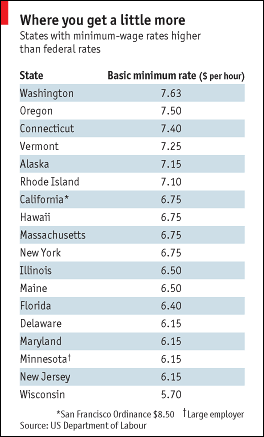| | ||||||
 |
| About sponsorship |
 | |
HOW much does it cost to buy an election? Supporters of the Democratic Party have a new answer to that question: between $1 and $1.70 an hour. That is how much minimum wages will go up in several states if voters in those places approve ballot initiatives this November.
Although there is a federal minimum wage of $5.15 an hour, each state can set the level higher if it wishes, and 18 states had done so before this year (see table). Now activists in six states are putting the issue on the ballot, giving voters a direct say. Arizona, Missouri and Montana have collected enough signatures, and Ohio and Colorado are on their way. Nevada will be voting for the second time, since amendments to the state's constitution must win twice at the ballot box (the measure passed easily in 2004, and is credited with helping Democrats win several races in the state assembly).
As Nevada showed, the reason for all this activity is not just to promote the cause of a higher minimum wage but also to boost turnout among Democratic voters, thus helping the party's candidates to win close races. This is the same strategy that the Republicans have been using for years to pummel the Democrats, relying on popular right-wing causes to draw conservative voters to the polls. In 2004, an Ohio referendum on gay marriage was widely credited with helping George Bush beat John Kerry in that state—and thus win a second presidential term. Instead of responding the way they usually do—by complaining, and then letting it happen again—the Democrats are fighting back.
The minimum wage is an ideal issue for boosting left-wing turnout. For a start, progressive voters are fired with the idea. They are tired of watching Republicans win elections by appealing to voters' “values”, and are convinced that “fairness” (which they believe minimum wages promote) is the most persuasive value they can offer. In addition, raising a state's minimum wage does not require tax increases, since the exchange is between employers and low-wage workers. Small-business owners, who would bear much of the cost, tend to be Republicans anyway.
Minimum-wage enthusiasts have been improving their salesmanship. Although there is a risk that higher minimum wages could hurt young, low-skilled workers by weakening job growth or training, the evidence is too sparse and sketchy to make a convincing case either way. But having watched conservatives in action on other ballot initiatives, Democratic politicians have learnt that the best way to deal with this sort of nuance and lack of evidence is to profess total confidence and brand your opponents as wicked.
Activists are convinced that they have found an ideal way to help Democratic candidates. Minimum-wage rises are wildly popular on the left but, like the gay-marriage debate in reverse, the issue does not seem to turn off opponents as intensely as it attracts supporters. Indeed, polling in many states suggests that the measures will pass easily so long as they can get on the ballot.
The policy is gaining respect among the party's most powerful groups, which, until now, have been slow to attach much importance to ballot initiatives. Labour unions were reluctant to spend millions of dollars on an issue that would not benefit their already well-paid workers. But when they realised that it might help Democrats win elections—and perhaps take over the House of Representatives this November—they became more supportive. John Edwards, Mr Kerry's running-mate in 2004, has been telling local Democratic caucuses that they should embrace the minimum-wage issue as a sure winner.
The only hitch in the Democrats' plan is that they are up against Republicans who are cunning at fighting this sort of battle. Republicans in Michigan's state assembly were so worried that a proposed ballot initiative would boost Democratic turnout that they dropped their resistance to the idea and passed their own law raising the minimum wage. It will go up by $1.80 in October, a month before the election. Low-paid workers will get an early gift—and a few more of Michigan's Democratic voters will stay home on election day.
|
Copyright © 2006 The Economist Newspaper and The Economist Group. All rights reserved. |